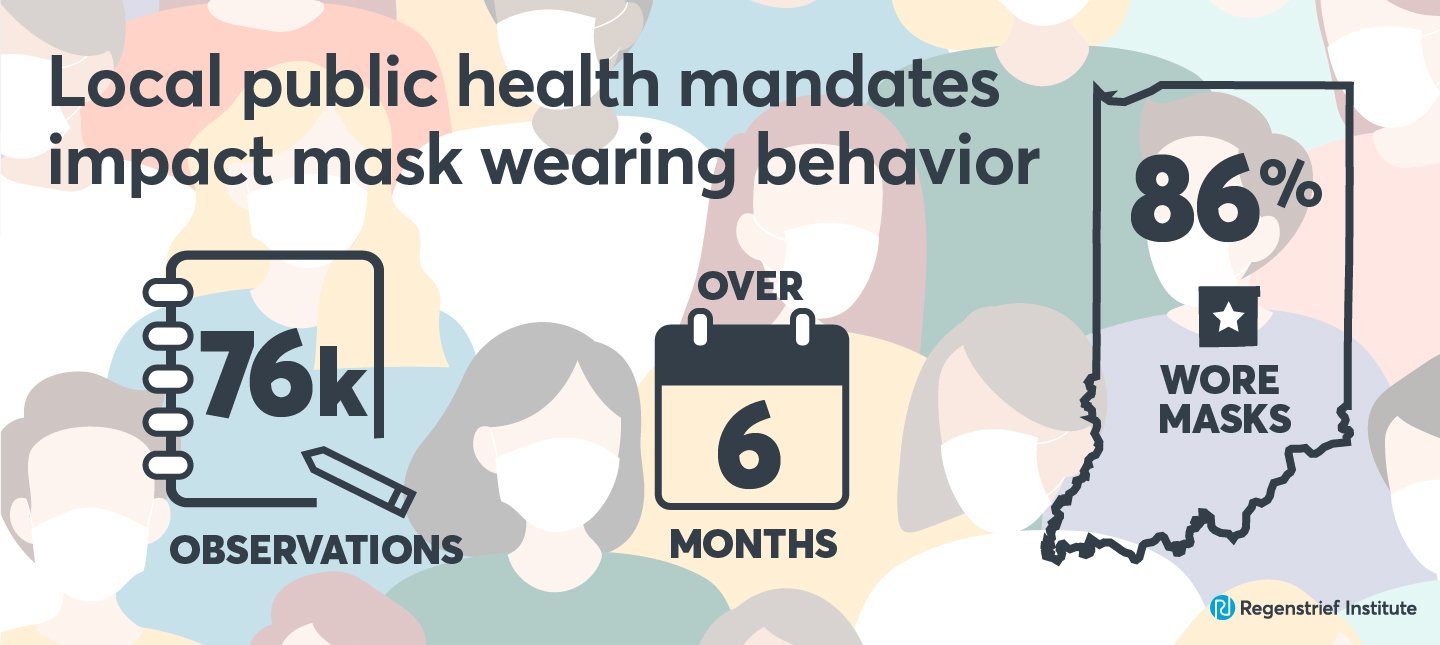Findings from a new study show impact of mask mandates on behavior
Local mask policies are strong influencers on mask-wearing behavior, according to new research from Regenstrief Institute, Indiana University Richard M. Fairbanks School of Public Health and Resolve to Save Lives.
Policies requiring face masks in public have been one strategy to address the COVID-19 pandemic, but the rules have widely varied among different levels of government and have changed over time.
As part of the study, trained team members went to public places to observe masking behavior. Between November 2020 and May 2021, they made 76,000 observations at grocery stores, big box stores, shopping centers, small retailers, higher education campuses and fitness centers in Indianapolis/Marion County, Indiana.
“Marion County had a mask mandate in effect through the duration of data gathering. This study found that most people wore masks, even after the State of Indiana lifted its mandate,” said first author Joshua R. Vest, PhD, MPH, Regenstrief research scientist and director of the Center for Health Policy at Fairbanks School of Public Health. “Despite major changes from the state and federal levels, people still followed local policy, demonstrating the large influence it has on public health.”
During the six-month study period, 86 percent of people wore masks. The research team reported signs to encourage mask-wearing were present at most observation sites, which may have supported the behavior. Correct mask-wearing was lowest at fitness centers and small retail stores.
“Ideally, public health policies should be aligned on all levels of government, but this research shows the importance of action at the local level, where it has strong influence on those in the community,” said Dr. Vest.
The authors also concluded that overall, federal strategic plans may not be very influential on individual behavior. The only time changes in guidance from the U.S. Centers for Disease Control and Prevention (CDC) significantly impacted behavior was when it recommended that fully vaccinated individuals did not need to be masked in public.
“Indoor Public Mask-Wearing Behavior Changes in Response to National, State, and Local COVID-19 Policies” is published in the Journal of Public Health Management and Practice. This work was made possible through funding from Resolve to Save Lives global health organization. Resolve to Save Lives is funded by Bloomberg Philanthropies, the Bill & Melinda Gates Foundation, and Gates Philanthropy Partners, which is funded with support from the Chan Zuckerberg Foundation. Resolve to Save Lives received additional funding for the COVID-19 response from the Stavros Niarchos Foundation and the Start Small Foundation.
In addition to Dr. Vest, authors on this paper are Shama Cash-Goldwasser, M.D., MPH of Resolve to Save Lives; Eleanor Peters Bergquist, PhD, MSPH, M.A. of Resolve to Save Lives; Peter J. Embí, M.D., M.S. formerly of Regenstrief; Virginia Caine, M.D. of the Marion County Public Health Department; and Paul K. Halverson, DrPH, MHSA of IU Fairbanks School of Public Health.
About Joshua R. Vest, PhD, MPH
In addition to being a research scientist with Regenstrief Institute, Joshua R. Vest, PhD, MPH, is the director of the Center for Health Policy and a professor of health policy & management at the Indiana University Richard M. Fairbanks School of Public Health at IUPUI.
About Regenstrief Institute
Founded in 1969 in Indianapolis, the Regenstrief Institute is a local, national and global leader dedicated to a world where better information empowers people to end disease and realize true health. A key research partner to Indiana University, Regenstrief and its research scientists are responsible for a growing number of major healthcare innovations and studies. Examples range from the development of global health information technology standards that enable the use and interoperability of electronic health records to improving patient-physician communications, to creating models of care that inform practice and improve the lives of patients around the globe.
Sam Regenstrief, a nationally successful entrepreneur from Connersville, Indiana, founded the institute with the goal of making healthcare more efficient and accessible for everyone. His vision continues to guide the institute’s research mission.
About the Richard M. Fairbanks School of Public Health
Located on the IUPUI and Fort Wayne campuses, the Richard M. Fairbanks School of Public Health is committed to advancing the public’s health and well-being through education, innovation and leadership. The Fairbanks School of Public Health is known for its expertise in biostatistics, epidemiology, cancer research, community health, environmental public health, global health, health policy and health services administration.
About Resolve to Save Lives
Resolve to Save Lives, an initiative of the global health organization Vital Strategies, focuses on preventing deaths from cardiovascular disease and preventing epidemics. It is led by Tom Frieden, M.D., MPH, former director of the U.S. Centers for Disease Control and Prevention. To find out more, visit: https://www.resolvetosavelives.org or Twitter @ResolveTSL










